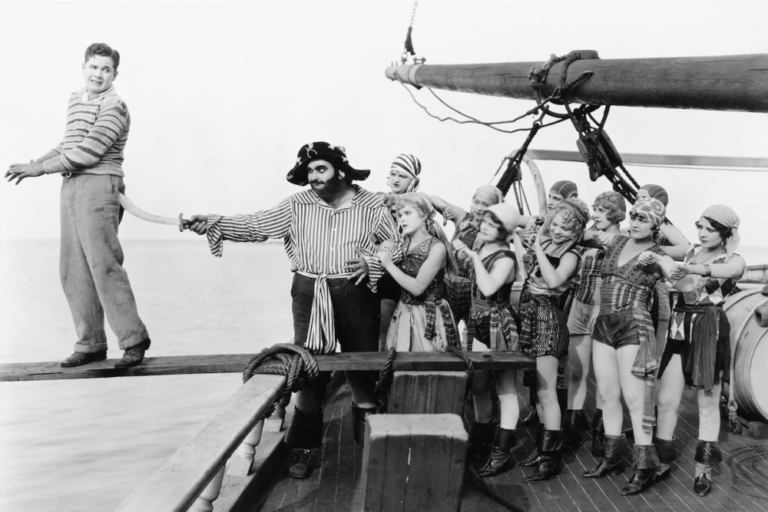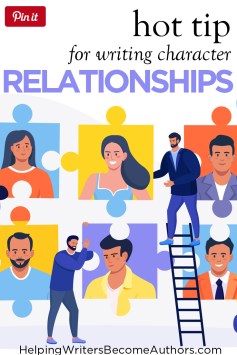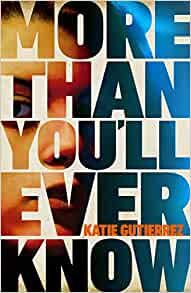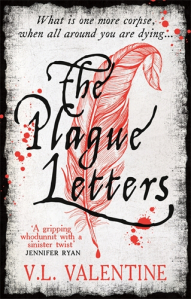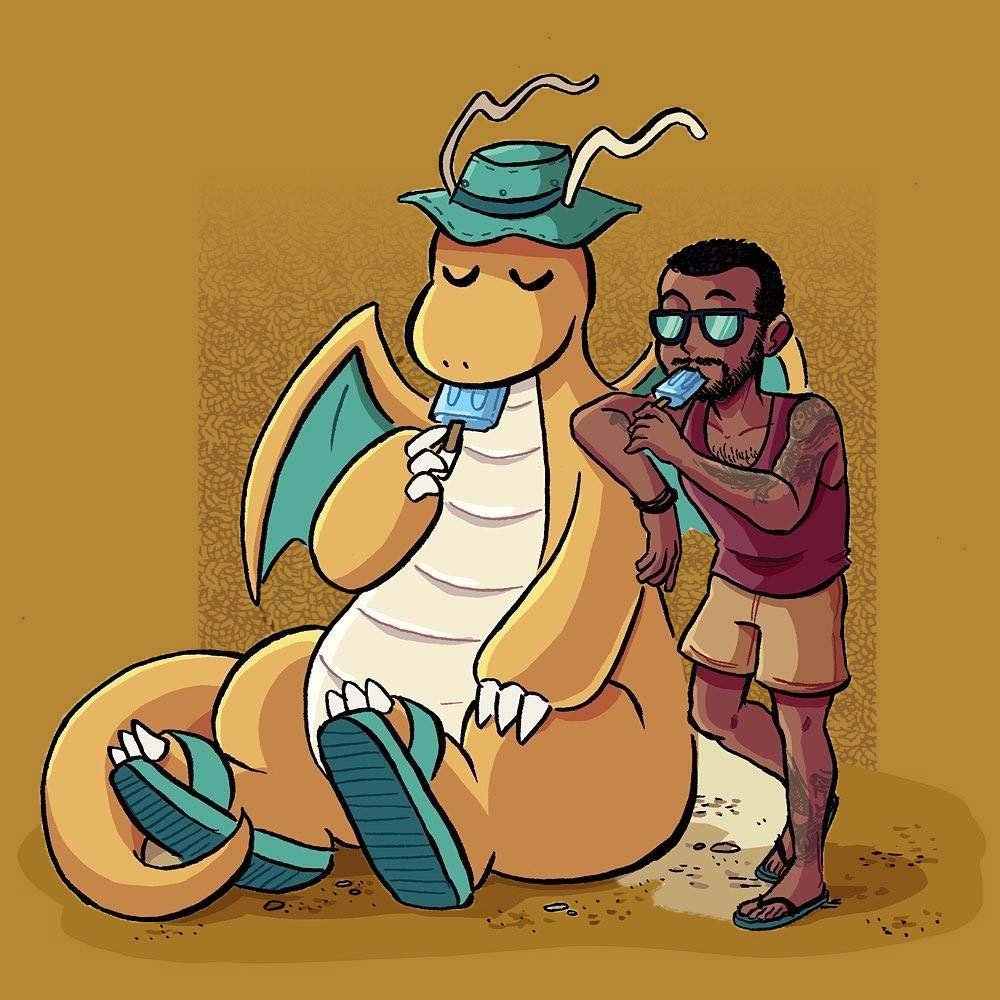
Image by Sara Goetter.
The game is played with great feeling. Pikachu, perhaps the most successful soft power symbol of the twenty-first century’s new media enterprise, looms gigantic over Nintendo as a concept and cuteness as aesthetic dominance, despite staying mostly benchside on the battlefield. Though, for some of us, these pocket monsters are just ciphers for the competitive video game circuit: 4D chess pieces; some amalgamation of straights, flushes, or full houses; the kings, queens, and rooks of RNG; what Dungeons & Dragons would be with rounded edges and big-lipped fish splish-splashing their way toward evolution. Next to my black-and-white Nintendo Switch sits the corduroy Bulbasaur my son got me for Father’s Day. I’m playing around with weather, one of four core environmental hazards in the extended Pokémon video universe: Rain, Sun, Snow, and Sand. Enjoying the filth I am, of a team whose prospects are slim but whose aesthetics please me, listenin to Beans and Freeway on my headphones. And even though what we do is wrong I play Tyranitar to start, a darkly rock type dinosaur with SAND STREAM, brewing up a storm when she enters the battlefield. Despite a soft-chinned weakness to FIGHTING types, Tyranitar is a respectable individual; she earned a slot on my team of six through grit and survivability, clapping back after absorbing heavy damage historically, just without the heroism of hindsight.
Pokémon is all about reading. Hard and soft. Soft, like how I can assume the way my opponent’s Iron Hands, a FIGHTING type, is trained based on trends in the meta game, whereby Pikalytics.com discloses player data amalgamated from prior battles. Most people plug this Pokémon into a hard-hitting tank slot: high HIT POINTS and ATTACK, made to live through anything and crush enemy morale thereafter; it’s what they’re good at, these hands. And as they say in The Players Club, you gotta use what you got to get what you want. And everybody wanna be the very best, of course, like no one ever was: picture Ash Ketchum listenin to Drake, confused, yet falling so deeply in love. But I respect my opponent’s awareness here. I change Tyranitar’s type to FLYING. Typical move, and my opponent could read me reading them and react to this and I could read their reaction and so forth in an endless chain of telekinetic tug-of-war. But he does not. Tyranitar resists the punch, and together, with the help of this ghost dog, Greavard, who burns Iron Hands—now at less than half-full health from Tyranitar’s foot in that ass—we carve a path toward victory.
A whole decade before Trey Songz couldn’t help but wait, I was beyond impatience rushing into the local EB Games store and slamming down my grass-cutting money for Pokémon Red. Its world has shaped my psyche for as long as I can remember, from soft-boy-kid card collector into dedicated owner of translucent purple Game Boys past. Afterward, I fucked around with the idea of getting into the official competitive scene, observing the e-sport from afar. But until this year and the death of the man who raised me, I’d never tried. There are lots of obvious reasons for this, like class background, money, and time, and the peculiarities of social existence, the navigation of white nerd spaces that have always made me queasy; sure, I’d swing by Benny’s Card Shop on Torresdale Ave. for cards, or hit a Yu-Gi-Oh! tournament here and there, but I was still more at home on the basketball courts in Mayfair, where rushing over to get winners would inspire fear from random white women in the suburb, diving into the tall grass to escape my representation. But I can’t play ball like I used to. Now I deliver the order in Super Smash Bros., Street Fighter, Little Big Planet, or Pokémon. Pokémon chief among them. This global trans-media product whose system of play elevates and then magnifies the stylistics of the chess or checkers or Speed I played with my aunt, the Texas Hold’em I played as a kid on Popop’s computer, the Dungeons & Dragons–style dice-roll mechanics grafted into my beloved Icewind Dale role-playing games. Teaching my children mathematics by the game’s pleasurable proxy, I watched their jaws drop at an equation for calculating battle damage in one turn of Pokémon:

On some level this is basic algebra, stretched out for the convoluted chorus of choice that such games demand: the multiplicity of variables that make generalizations both iffy and necessary, as in life. With more than a thousand Pokémon, some of whom have dozens of usable moves or abilities combined, complex type matchups, and SPEED interactions—not to mention the impact of item choices and player particularities—every best-of-three competitive Pokémon match is a master class in complexity. With at least thirty larger tournaments a season, and several hundred players in the video game division alone, not counting all the special events and local setups, the online tournaments and unofficial skirmish matches, the game’s growth, especially in the past few years, tells the story: throngs of people lined up outside convention centers and local stores all across the world, sold-out regional and international competitions from London to Chile, Indiana to Portland, up to sixty-five thousand dollars in prizes, and the chance to compete for the world title, which, held last year in Yokohama, Japan, ran out of spectator passes near instantaneously.
And while I’m never stepping on a court serious with AI or LeBron or Steph—shit, I couldn’t even check Damon Young last year at his local gym—anyone can play against some of the best in the Pokémon game by virtue of its general openness, whereby openness, of course, involves money. Getting out to a Pokémon tournament ain’t like buying Beyoncé or Taylor Swift tickets, but it’s also not getting penny candies from the corner store. Registration might run you around seventy dollars, but that’s the small of it; the real shit is paying for the hotel and travel. Many players move in groups, sharing the cost, at the very least, of housing. Having taken years off from gaming for real for real—between children and changing careers and being deployed to Baghdad and writing the book and all the college-degree collecting and grade-school trips and deaths in the family and living, and living and COVID and calls from school and calls from court and calls from hospitals and calls from the shelter—I have never been part of such a group.
The Pokémon VGC regionals in Charlotte, North Carolina are notorious for attracting some of the best players and biggest crowds, so when you walk into the Charlotte Convention Center there’s a shoulder-to-shoulder clash of subcultural sycophants and lookie-loos and handshakes and hugs and awkward mustiness and ashy lips and great hair and gold frames and ill-fitting blouses and incredible cosplay fits and unexpected intimacy and accidental resistance to normativity collapsing space in the otherwise stale corporate enclosure, often stifled by a well-meaning yet reactionary adherence to the law as concept. The crowd is mostly male, though one might be surprised, or not, in comparison to other gaming events at this scale, by how many women and trans people attend, through force of will, putting in work over the pre-ascriptions of boys’ club etiquette, just like one might be surprised, or not, at the casual anti-black structure of feeling also common everywhere else in the world. I lose my second game and shake my opponent’s hand afterward, saying “Good game” all the while, the stock phrase of match completion which, when I have any energy, I try to avoid by actually speaking to people. We’ll become friends a few tournaments down the road, but in the moment, I’m deliberating on the optimization of both myself and my Pokémon team—do I get rid of Tyranitar and Greavard for creatures with more bite? Is it more important to win or to grasp the momentary pleasure of a great turn or two?—collapsing the self-reflective improvement ethos of who I am and what I do.
And that’s when I hear it. A group of black men behind me:
“Nigga,” one of them says. “If I win a regional imma flip a table out this motherfucker.”
I’m laughing off instinct, off familiarity, already. These are my people, I think. The niggas. Here I am, comically attentive to one of my favorite words in the English language, to its proper use and rigorous subversion of feeling in the fuckment we call the English language, making me feel, just that fast, closer to some kind of home. Hard to go without a joyous nigga, the word as filler, as family, as functional connector of species, the great tendon of my own speech.
“So proud of you, nigga!” another nigga says.
They’re all hugging in a magic circle, making jokes. The one we’re proud of is Silver, undefeated the whole first day of regionals, 9–0. My satisfaction is magnified by his appearance: weight-lifting type dude covered in tattoos, the jeans and a hoodie, gold chain and backward cap and swagger-like-us mode of moving that makes me think, especially in this setting, Do I know this nigga from somewhere? I find out only later that he was also in the military, had joined up after a time for the resources otherwise denied, always denied, and the loved ones who need just as much. After getting knocked out with a pretty average record at 5–4, I watch the rest of Silver’s games and exchange info, dap him and the rest of his crew by way of introduction, letting them know I’m writing a book about playing competitive Pokémon. Quiet as it’s kept, there’s a lot to say, just not here, and not always now.
Things happen, and niggas don’t do as well as we’d hoped, neither Silver nor Aarush or Jorge or Damon, and the only shame would be stopping there, I suppose—we’ll come back next year. The potential to play gets me giddy at times, like the boy I was never supposed to be; we were never supposed to be. It encourages one to wonder what’s possible in this smaller social world, the structures of almost-togetherness heaped upon with strangers, how I’m besieged by the naive sincerity I had discarded for survival until now, and how this is also a dimension of being a black man in public. I return to Omari Akil’s provocation about Pokémon GO: the death sentence, they called it, if you’re a black man, lambasting the augmented reality approach to catching Pokémon in the streets as a safety hazard in a racist society—though one could always already guess, given history or intuition, where the best Pokémon or important locales would be, where risk would be assumed and by whom. It’s hard for me to shake the state of any game from what happened today or yesterday, what will happen next year or what went down in the eighteen- or nineteen-sixties. So why then, I ask myself, does this thing here feel so much like life?
Joseph Earl Thomas is a writer and gamer in Philadelphia. He is the author of the memoir Sink, and the novel God Bless You, Otis Spunkmeyer.

